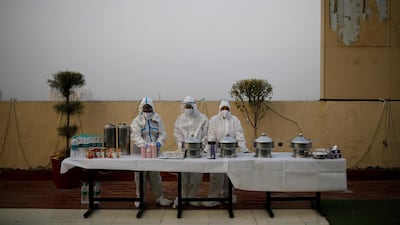India's soaring coronavirus caseload passed 5-million mark on Wednesday, testing the country's feeble healthcare system in tens of thousands of impoverished towns and villages.
The health ministry reported 90,123 new cases in the past 24 hours, raising the country's confirmed cases to 5,020,359, about 0.35 per cent of its nearly 1.4 billion population. It said another 1,290 people died in the past 24 hours to take the death toll to 82,066.
The US with more than 6.6 million cases leads the global tally of infections and India is expected to surpass it within weeks.
India has for some time been recording the world's biggest daily jumps in cases, and on Wednesday, the rise topped 90,000 with a record 1,290 deaths.
While India took 167 days to reach one million cases, the next million came in just 21 days, faster than the US and Brazil, according to The Times of India.
Twenty-nine days later, India became only the third country after the US and Brazil to post four million infections. India passed Brazil earlier this month.
Even so, and with India now testing about a million people daily, many experts say that this is not enough and that the true number of infections may be far higher.
This has been borne out in several studies in recent weeks measuring antibodies against the virus among the cramped populations of megacities New Delhi and Mumbai.
The India Council for Medical Research, the country's lead pandemic agency, said last week that its survey had suggested that already in May, 6.5 million people were infected.
The same goes for deaths – 82,066 as of Wednesday, less than half the US toll of 195,000 – with many deaths not properly recorded by authorities even in normal times.
India has one the world's most poorly funded healthcare systems and the nation of 1.3 billion people is home to some of the most densely populated cities and towns.
The sharp rise in cases is despite Prime Minister Narendra Modi's government imposing in late March one of the world's strictest lockdowns, leaving tens of millions of people in the informal labour market jobless almost overnight.
The lockdown led to complete travel bans, shutting down of businesses and factories, and the flight of millions of poor migrant workers from big cities to their villages that experts say caused the virus to spread from urban centres to small towns.
India's GDP slumped nearly 24 per cent in the first quarter, one of the steepest drops among major economies.
The lockdown has been steadily eased even as infections soar, with schools set to open for some classes on Monday – along with tourist hotspot the Taj Mahal.

